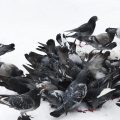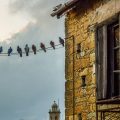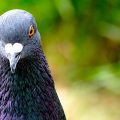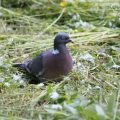Table of Contents
There is really no scientific dichotomy between the fancy pigeons as well as the doves. They are simply known as one or the other through the ordinary names that were given to them over the years. The term “pigeon” typically applies to bigger species while “dove” to the smaller counterpart.
These birds come in different sizes, starting from the size of the sparrow up to the size of a large chicken. Even though they are not really the most brightly colored birds, but these fancy pigeons and doves are very beautiful. There is a great difference in color pattern as well as colors, it ranges from whites, blue grays, up to any shade in between. This is what makes the fancy pigeon type very unique.
Body Types
The pigeons and doves fall either to one of these body types, one is the one with a slender body while the other one is plump and short. The larger birds are seen with deep-chested bodies and very muscular. They have pretty small heads and coupled with short and scaled legs. The beaks of these birds are very short, small, and narrow and the tip is slightly bent down. The nostrils are very wide open and their cere is pretty much featherless.
Fancy Pigeon Life Span
We are certain that your fancy pigeon will live for a long period of time. It may live for around 10 to 12 years, while some might live even longer. There are many available doves and fancy pigeon breed available. There are many variations of the pet dove, it includes the pet pigeon as well as show pigeons which could be found through our trusted breeders and pet industry. The following are the types of pigeon and dove breeds, it includes:
- Barbary Dove
- Diamond Dove
- Green Wing Dove
- Mourning Dove
- White Dove
- Ringneck Dove
- Senegal Dove
- Spotted Dove
- Bleeding-heart Pigeon
- Brunner Pouter Pigeon
- Budapest Tumbler Pigeon
- Chinese Owl Pigeon
- Crested Pigeon
- English Trumpeter Pigeon
- Indian Fantail Pigeon
- Maltese Pigeon
- Old German Owl Pigeon
- Oriental Frill Pigeon
- Purple-breasted Fruit Pigeon
- Rock Pigeon – Common Pigeon
- Valencian Figurita Pigeon
- West of England Tumbler Pigeon
When they live in the wild, your fancy pigeon likes to eat berries, seeds, fruits, shoots, green leaves, spiders, and also other insects. The spiders that they like to eat are the seed eaters belonging to the subfamily of Columbinae. The fruit eaters belong to the Treroninae subfamily but they are not seen in captivity because it is very difficult to feed them. The seed eaters can be known into three categories: ground feeders, those who only feed only in shrubs and trees, and those who can eat in both places.
What Fancy Pigeons Eat
The diet of the fancy pigeon is typically composed of a basic commercial mix that is supplemented with greens that are rich in minerals which are regarded to be very suitable. The greens that can be included in this list is endive, lettuce, chickweed, watercress, spinach, and watercress. Fruits that can be eaten by your bird include apple, berries, and pear. For a smaller version of pigeons and doves, you can use a canary mix or even a budgie. However, your smaller bird might also enjoy millet spray.
The only available food for your fancy pigeon would include seed only diets, diets that are specifically formulated such as extruded or pelleted, and some commercial mixes that consists of seed, legumes, and cereal. The seed only diet as well as the commercial mixes need to have supplements for a complete nutrition. Loose stools could be caused by formulated diets, although the formulated diet has the same nutrients as the commercial mixes. The cause for this problem is the addition of molasses, however this is not a problem today because it is not used today.
Supplements
- Grit and Gravel: Fancy pigeon teat seeds whole, pigeons and dove need grave and grit. The grit as well as the little stones would help them grind up harder seed in the glizzard.
- Vitamins: You can add vitamins to the water or sprinkle it on food in a dry form for about once a week.
- Calcium: You can give calcium through grit, crush oyster shell, as well as cuttlebone for your smaller birds.
- Other Supplements: Some owners like to give bird crumbles, water, water soaked dog biscuits, and milk soaked bread.
- Water: You need to give fresh water everyday. Your pigeon and dove like to drink water through sucking it up and then swallowing it all up. Their way is very different from the other birds who throw their heads back like what the other birds like to do. One of the greatest ways to give water and to prevent your bird from soiling it is by using an “automatic” waterer. This is an upside down container that feeds into a tray type base.
Bird Baths
A bath coupled with a preening and sunning of their bodies is the personal hygiene of your pigeons. Some birds like to take a bath while some likes to have a shower, but some also likes to have a dust bath. This shower could be done using a hand held sprayer or through a hose using a fine spray head and a lukewarm water.
Bird Grooming
During their preening moment, many of the birds would have “powder feathers” rather than having an oil gland that are found in other birds. To spread the powder all over their feathers, they use their beaks. This bird will molt once a year and would just replace a few feathers at a time but not at all. In this time, the molting will start with the wings feather first, after which, the body will molt throughout the period, and the tail feathers will molt the last.
Wing clipping is both unnecessary as well as not recommended for both pigeons and doves. Unlike birds belonging to the parrot family, these birds has no ability to climb to safety as well as depend on flight.
Housing
The size of your pigeon or dove would determine the size of its home. Your pet must be able to flap its wings without ever hitting the sides. Diamond Dove, as well as other small birds, should be housed in a cage. Medium to large sized birds will thrive must better in an aviary. You need to give a free flight as well as a dovecote for them. Unlike any other large fancy pigeons, most of the small doves only have a dew homing instincts and would not do well if you release it outside. They are not really great candidates for free flight housings.






 Author and long-time animal lover. Sharing knowledge on pet care through experience and the written word.
Author and long-time animal lover. Sharing knowledge on pet care through experience and the written word.